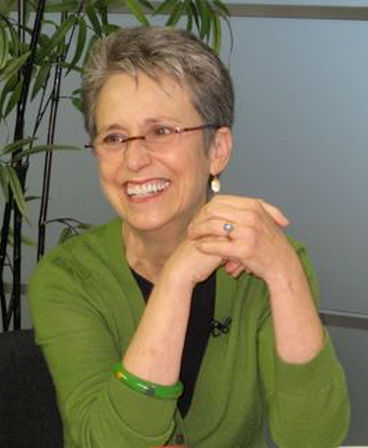Title of the work
Country of the First Edition
Country/countries of popularity
Original Language
First Edition Date
First Edition Details
Kate McMullan, Myth-O-Mania: Get to Work, Hercules! Mankato: Stone Arch Books, 2012, 208 pp.
ISBN
Genre
Humor
Mythological fiction
Novels
Teen fiction*
Target Audience
Children (8–13)
Cover

We are still trying to obtain permission for posting the original cover.
Author of the Entry:
Ayelet Peer, Bar-Ilan University, ayelet.peer@gmail.com
Peer-reviewer of the Entry:
Lisa Maurice, Bar-Ilan University, lisa.maurice@biu.ac.il
Elizabeth Hale, University of New England, ehale@une.edu.au

Photo courtesy of Kate McMullan.
Kate McMullan
, b. 1947
(Author)
Grew up in St. Louis, Missouri, but now lives in Sag Harbor, New York. McMullan began her career as a teacher after which she studied Early Childhood Education. She worked as a teacher in Los Angeles and an American Air Force base in Germany. She is married to and works with the illustrator Jim McMullan.
She has commented: "As soon as I could, I began reading my way through the Children’s Room shelves at our local public library in St. Louis, Missouri. I carried my books home, settled in with a cat or dog or my guinea pigs on my lap, and read for hours. My favorites were Greek myths, Nancy Drew mysteries, Pippi Longstocking, and animal stories, but only if the animals didn’t die. I also read Little Women (it was sad but acceptable if people died) and The Borrowers, about tiny people who lived behind the walls of houses. I loved comic books, too, and Mad Magazine. When asked what I wanted to be when I grew up, I answered, "A reader."
"After college, I taught fourth grade in an inner-city Los Angeles school and on an American Air Force base in Germany. Every day after lunch I read to my students, and in time I started to wonder if I could write books like the ones I read to my class. I tried, but after a day of teaching, I had little energy left for writing, so I moved to New York City, where I’d heard writers lived, and took a job in publishing, which was less tiring than teaching."
"And I kept writing – stories about Fluffy, the Classroom Guinea Pig (who will never die), a Greek Mythology series, books set in a medieval school for dragon-slaying, and picture books with art by my favorite illustrator, Jim McMullan." (source, see here, accessed: February 21, 2019).
Since she started writing, McMulland has published over 100 children’s books. Her book Pearl and Wagner: One Funny Day was a Geisel Honor Book, and her book I Stink! was a Boston Globe-Horn Book Award Honor Book.
Sources:
Official website (accessed: June 26, 2018).
Profile at penguinrandomhouse.com (accessed: June 26, 2018).
Profile at harpercollins.com (accessed: June 26, 2018).
Profile at amazon.com (accessed: February 21, 2019).
Bio prepared by Allison Rosenblum, Bar-Ilan University, allie.rose89@gmail.com and Tikva Schein, Bar-Ilan University, tikva.blaukopf@gmail.com
Questionnaire
1. What drew you to writing / working with Classical Antiquity and what challenges did you face in selecting, representing, or adapting particular myths or stories?
I have always loved the ancient Greek myths, even as a child. I write books for kids, and thought it would be fun to retell some of the myths with a bit of twist, and what I came up with was using Hades as my narrator. In some versions of the myths, Hades is Zeus's older brother, and I thought having his little brother be the ruler of the Universe would annoy Hades quite a bit, so I figured that would make his retelling funny and engaging for kids.
2. Why do you think classical / ancient myths, history, and literature continue to resonate with young audiences?
I believe it's because the dieties are, for the most part, depicted as very human, with great character flaws as well as the capacity to do great good. I think humans connect with these gods and goddesses because of they show different aspects of the human heart.
3. Do you have a background in classical education (Latin or Greek at school or classes at the University?)
NO.
4. What sources are you using? Scholarly work? Wikipedia? Are there any books that made an impact on you in this respect?
I used the D'Aulaires' Book of Greek Myths and Theoi.com as well as various other sources. Although I wasn't telling the myths in the traditional way, I did try to stay faithful to the way each myth is usually presented.
Prepared by Allison Rosenblum, Bar-Ilan University, allie.rose89@gmail.com

Photo courtesy of Denis Zilber.
Denis Zilber
, b. 1962
(Illustrator)
Denis has a diploma in Advanced Character Animation Studies and has won the following awards for his freelance work as illustrator and character designer: “CG Choice” award of CGSociety.org (3 times), Animation Mentor Showcase 2009, Frontpage Exellence award of 3DTotal.com (twice). He has publications in Expose 4 – Finest digital art in the known universe by Ballistic Publishing, Australia, as well as in 2D Artist magazine and CGWorld magazine.
Source:
Official website (accessed: May 29, 2018).
Bio prepared by Allison Rosenblum, Bar-Ilan University, allie.rose89@gmail.com
Summary
This is the seventh book in the Myth-O-Mania series, which offer alternative versions of the Greek myths, narrated by Hades. Hades, who is a self-professed shy and serious god, promises to tell the whole truth about the Greek myth; he claims that his brother Zeus, is a myth-o-maniac (that is, a liar) and that he fabricated the myths and wrote his version so that he and his children will appear noble and praiseworthy. Hades’ versions offer the “true” story of the myths.
In this book, Hades reveals the truth behind the myth of Hercules. Hades describes Hercules as a muscular man with no brain and with a temper, who needed the help of Hades to finish his labors. As in the original myth, Hera resents the boy and plans to harm him and Hades is asked by Alcmene to help guard him. Since Hercules’ temper is getting harder to control, his parents Alcmene and Amphitryon decide to send him to a faraway farm, which is owned by Amphitryon’s second cousin and his wife, Humus and Pita. On his 18th birthday, Hercules’ parents leave him a note saying that the time has come for him to choose his path in life. When Hercules leaves the farm he encounters two tall women, one offers him fun and easy life and the other hard work. While this event is reminiscent of Hercules’ philosophical encounter with Virtue and Vice, their names are not mentioned specifically and the women are mentioned as offering him an easy or hard path. Hercules decides to take the hard path. Later Hercules travels to Delphi where the oracle tells him that King Eurystheus will give him 12 labours to fulfill as part of the hard path he had chosen. Yet the oracle was in fact Hera who tricked Hercules into these difficult labours. Hercules succeeds performing the labours with the help of Hades. In the end, Hera agrees that Hercules has suffered enough and she gives him her daughter Hebe as a wife and promises to make him immortal. However, Hercules rejects her offer and tells her that he chose the hard path and there are more mortals who might need the help of a hero like him.
Analysis
In this humorous chapter-book for young readers McMullan offers a version of the Hercules myth that encourages reflection on morality and self-determination. The author is very conscious of her young readers. Therefore she makes Zeus marry all the mortals he originally slept with in the myths, and explains that all he wanted was to create a huge dynasty so he married many mortals and mortal women. However, Hera was his latest wife and it is explained that she hated the children from his previous wives; that way the discussion of Zeus’ adultery is avoided. Hades suggests to Alcmene to name the boy after Hera, Heracles, to appease the goddess, but she refuses. He then suggests she can name him by his roman name, Hercules; once again in this book, as in the book about Cupid, the Greek and Roman are mixed together.
As in the previous books, the big mythological heroes are reduced to comic characters in this series. Here, for example, Hercules in his youth encounters a lion, which turns out to be vegetarian and they have a chat. This lion tells him about the Nemean lion (named in the story NemEan). The talking lion, Cee, jumps over Hercules and disguises himself as his cape. The author is taking the old myth, reducing it to absurdity and thus draining from them their ancient pathos. She is very conscious of her young readers and probably wishes to show how the heroic Hercules travels through a comic and friendly world, and not too intimidating one. (A nice example are the people with whom Hercules resides at a young age, comically named Humus and Pita).
Hercules is given the labours as a consequence of the hard path he chose, rather than as a result of any harm he caused to anyone, as the author consciously makes him a likable, ditzy character, instead of a murderer. In the end, Hercules is a strong young man who wishes to create a name for himself and live adventurous life; there is no redemption in his acts. Hercules accomplishes his tasks with the help of Hades and his friends. All the tasks are told jokingly and do not involve any harm or killing. Even Hippolyta agrees to help Hercules when Hera rallies the amazons with the pretense that the queen was kidnapped. Hades then calls Poseidon, who takes Hippolyta back to her people, in order to avoid bloodshed. All the labours are thus more comical than dangerous.
The ending of the story is as unique as the entire narrative. It is Hera who offers Hercules immortality and her daughter in marriage and it is Hercules who declines her offer, by choosing to continue being a hero on earth. Hercules tells Hera that there are more monsters for him to kill and more mortals who need his heroic help. This is the happy ending and resolution the author chose to end the feud between the two, Hercules does not really suffer, and he continues his heroic path for the time being. It is more important for Hercules to be a hero among his fellow humans than live on Olympus with the gods. This shows that immortality seems less appealing (to Hercules at least) than his adventurous mortal life and it also shows that being a god is not the most coveted thing for mortals. Doing their best on earth is more important.


